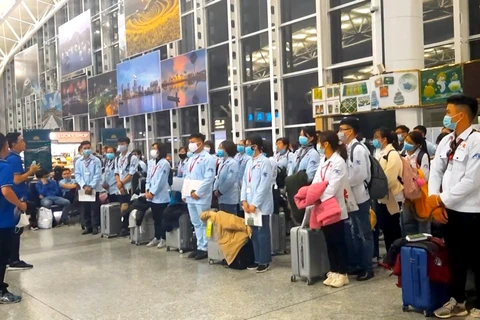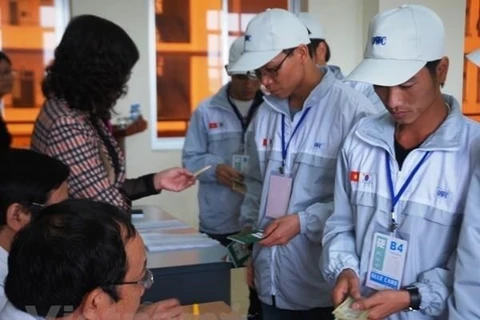Hanoi (VNA) – Vietnam is currently focusing on talks with Hungary in order to sign an agreement or a memorandum of understanding (MoU) on the dispatch and reception of Vietnamese workers to Hungary.
In recent years, Hungary has been emerging as a market drawing interests from labourers looking to work abroad. With attractive salaries, support for meals and accommodation and relatively low expenses, an increasing number of labourers are choosing to work in Hungary instead of traditional markets such as Japan, the Republic of Korea (RoK), and Taiwan (China). This represents a new direction towards the development of a labour export market in Europe for Vietnam.
A reporter from VietnamPlus recently held an interview with Dang Sy Dung, Deputy Director of the Department of Overseas Labour under the Ministry of Labour, Invalids, and Social Affairs (MoLISA), regarding the potential and opportunities for Vietnamese workers in Hungary.
Over 2,700 guest workers sent to Hungary
Reporter: In recent years, Europe has become an attractive destination for Vietnamese workforce, with Hungary leading in terms of the number of guest workers. Could you tell us how this market has been opening up and developing?
Dang Sy Dung: To meet the domestic labour demand, Hungary requires a significant influx of foreign labour. In addition to workers from the European Union, Hungary also has a demand for those from non-EU countries to work in sectors such as industry and agriculture.
Vietnam only began sending guest workers to Hungary in 2018, and their total number has to date surpassed 2,700, which has been gradually increasing over the years. It reached 465 in 2021, 775 in 2022 and 1,148 in the first nine months of this year.
Apart from traditional markets receiving a significant number of Vietnamese labourers, such as Japan, Taiwan (China), and the RoK, we are now focusing on exploring new directions and developing the labour market in some European countries, including Hungary and expanding to others like Poland, Slovakia, and Croatia.
Among them, Hungary shows great potential, and we are currently in discussions with Hungary regarding the possibility of negotiating and signing an agreement/MoU on the dispatch and reception of Vietnamese labourers in Hungary. This is aimed at protecting their legitimate rights and interests in this market in accordance with the laws of both countries.
Reporter: So far, how many firms have been licensed to send workforce to this market, which sectors they are working in and what their salary level is?
Dang Sy Dung: Up to now, the department has approved labour supply contracts from 25 service companies specialised in the recruitment and dispatch of guest workers to Hungary.
The Vietnamese labourers are usually employed in various sectors, including welding and metalwork, construction, manufacturing and processing, woodworking, mushroom cultivation, hotels and restaurants in Hungary. Their employment contracts last two years.
Since January 1, 2023, their basic monthly salary has been not lower than 232,000 HUF (660 USD).
Their working hours are 8 hours per day, 5 days per week, and any work performed beyond these hours is subject to overtime pay (as per Hungarian law, workers receive 150% of the basic salary for overtime on regular days and 200% on holidays). They are also entitled to paid holidays and annual leave in accordance with Labour Law of the host country.
In particular, workers are provided with three meals a day and free accommodation by their employers. The cost of travelling between their living places and workplaces is also covered by employers. Employers provide free transportation from the living places to the workplaces and vice versa or cover these expenses.
Employers bear the cost of round-trip airfare for workers upon completing their contracts.
The expenses incurred by workers before their departure are mostly service and visa fees, and others. The service fee is regulated to be no more than one month's salary per 12 months of work under the contract, with a maximum of no more than three months' salary per contract lasting 36 months or more.
Focus on recruitment process
Reporter: It could be seen that Hungary is a relatively new market with high income, good working conditions, and catching the interest of Vietnamese workers. So, what should they pay attention to?
Dang Sy Dung: Those interested in contract-based work abroad in general, and in Hungary in particular, should carefully study the relevant legal regulations.
 MOLISA leaders join in a discussion with Hungarian enterprises to promote the dispatch of Vietnamese guest workers to Hungary. (Photo: VietnamPlus)
MOLISA leaders join in a discussion with Hungarian enterprises to promote the dispatch of Vietnamese guest workers to Hungary. (Photo: VietnamPlus) Particularly, they need to thoroughly learn about specific information regarding businesses authorised to recruit and send workers to Hungary, the types of jobs, contract duration, and requirements related to language and working skills, and the fees required to work in this market.
They could check the portal of the department at www.dolab.gov.vn or call the number 0243.8249.517, extensions 513, 510, and 512 for further information.
Reporter: In order to prevent the illegal labour runaways that have occurred and negatively impacted some markets, what solutions does the MoLiSA have in place to sustain and develop the Hungarian market, a new and potentially growing one?
Dang Sy Dung: According to reports from the 25 enterprises licensed to supply workers to Hungary since 2018, the Hungarian firms have praised the Vietnamese workers as diligent, friendly and disciplined. The demand for Vietnamese workers in Hungary has also been increasing year by year.
To develop the Hungarian labour market and follow the instructions of the MoLISA, the department has discussed the possibility of signing a relevant agreement/MoU with competent Hungarian authorities.
It asked service businesses in general, and those approved to execute labour contracts for sending workers to Hungary in particular, to adhere to the legal regulations on their working activities.
They must select the right candidates, those with a genuine desire to work abroad, necessary skills and language proficiency to meet the requirements of the recipients, good organisational and disciplinary awareness. They are also required to provide complete information to workers about their jobs, rights, benefits and responsibilities while working in Hungary.
We requested firms to effectively organise the management, support and protect the legal rights and interests of guest workers, promptly detect and deal with issues involving them.
In addition, we are enhancing the dissemination of information about the overseas labour markets, including Hungary, legal regulations governing the activities of sending workers abroad, information and advisory services. We are also providing information about legally regulated channels for working abroad, as well as a list of businesses licensed to provide labour dispatch services, thus enabling labourers to make informed decisions.
We are also increasing inspection and enforcement to strictly deal with any legal violations to develop a stable market.
- Thank you very much!

























